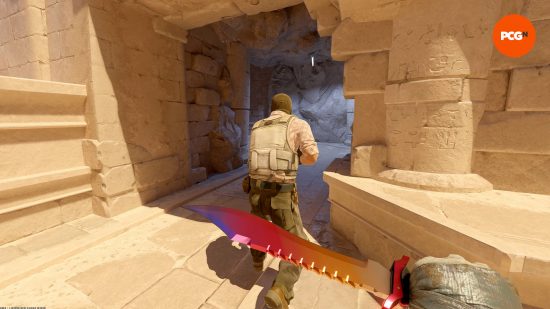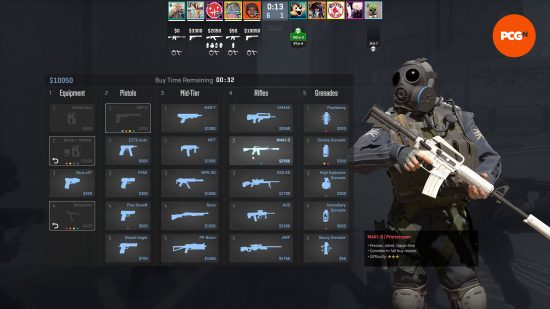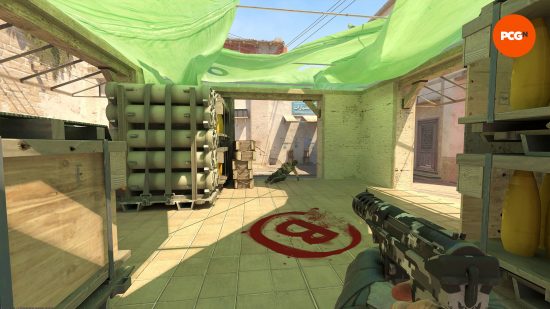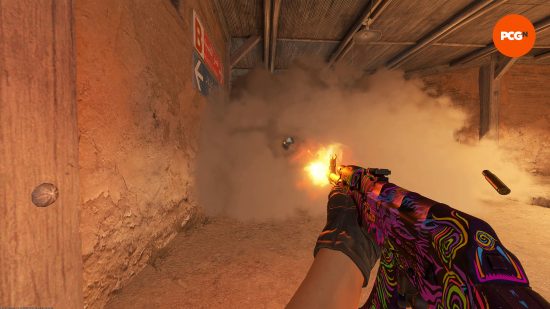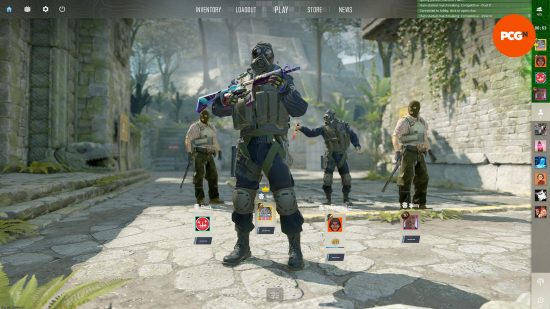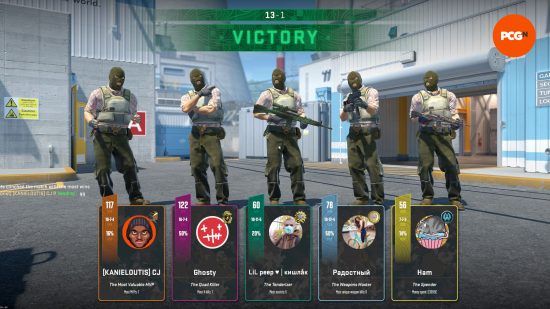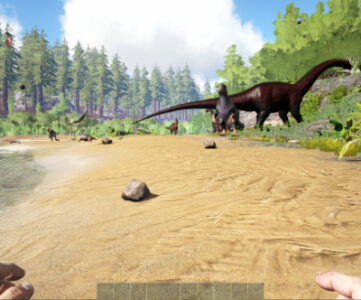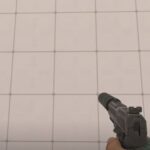[ad_1]
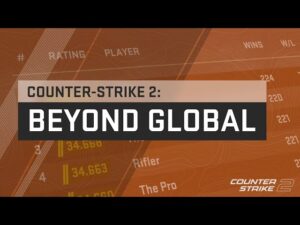
Our Verdict: Counter-Strike 2 review
Counter-Strike 2 review: Valve has improved the Counter-Strike formula with the release of CS2, even if there’s still a lot of work to be done before it’s feature complete. While we’re in the dark on specific timelines, the developer’s work rate has been promising since launch, and if it continues at this pace, we’re in for an exciting 2024 as Valve ushers in a new era of Counter-Strike.
Valve chose to release Counter-Strike 2 at the end of September 2023, less than four weeks after the limited test. This test wasn’t as feature-packed as CSGO, but most people assumed the missing features would arrive come launch. As this CS2 review goes live, however, not only is the game still missing several key features, but new bugs are being discovered every week.
It’s rare that Valve releases, well, anything, let alone something ahead of time. This is an uncharacteristic move for the Washington-based developer. The influx of new players has allowed Valve to collect huge amounts of data. When the CS2 community discovers a problem, Valve usually addresses it within a matter of days. This update cadence started when the limited test went live and, weeks after launch, it’s continuing to happen at a rapid pace.
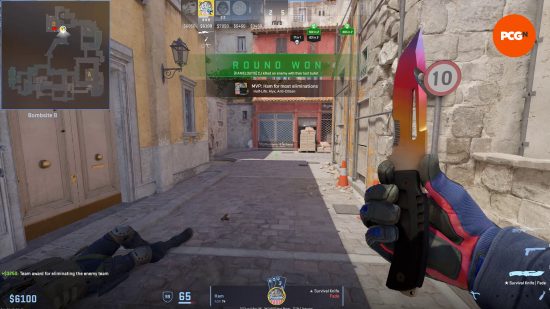
Given the number of issues that have popped up in a short amount of time, it seems strange that Valve decided to take CS2 out of its limited test phase. By proudly announcing the game’s full release, Valve has been able to stubbornly lock the door on CSGO, stopping players from accessing the matchmaking servers in the old game. Whether you like it or not, the next generation of Counter-Strike is here.
On paper, things sound much worse than they are in reality. Though the transition to Source 2 hasn’t been as smooth as it could’ve been, CS2 is the same 5v5 shooter players have been used to for over a decade. From a gameplay perspective, CSGO wasn’t broken, so Valve hasn’t attempted to fix it. CS2 builds on CSGO’s foundations while carefully avoiding scaring off any existing players.
Counter-Strike’s economy system has also remained untouched, despite the change made to the number of max rounds in competitive games, dropping from 15 to 12 to make matches shorter overall. Players have suggested that Valve adjust the prices of the CS2 guns, particularly on the CT side where money is a limiting factor. In CS2, if you lose the first few rounds as the CTs, it can be difficult to stage a comeback as your economy doesn’t recover in time.
While it may sound strange to some people to hear that CS2 doesn’t feature any new guns, this isn’t the type of game with a shifting weapon meta. CSGO was as close to perfect as you can get, which is why CS2 feels largely the same as its predecessor. This is why we won’t see a portion of the community clamoring for the days of old. Unlike the massive leaps made between Counter-Strike games in the past, this sequel is more of a gentle hop in comparison.
After years of waiting, Counter-Strike finally receives a much-needed engine upgrade. The Source engine did extremely well to last as long as it did, but the rumors started to stack up that it was becoming a hindrance. The shift to Source 2 means Valve is starting with a clean slate, and this might explain why CS2 is missing so much at launch. I’m not going to pretend to be a game developer, but it seems obvious that porting over old game modes isn’t as simple as dragging ancient files into a fresh folder.
CS2 received a huge makeover thanks to the engine upgrade, along with freshly updated maps that add a splash of color and revamped lighting to the game’s iconic arenas. Areas players have seen thousands of times before have been transformed when using the best CS2 settings. I was amazed to see the tarp that loosely covers Bombsite B on Mirage is made of a translucent material, producing an emerald light that shines onto the site.
Counter-Strike has never been the prettiest game, but for the first time, CS2 genuinely rivals its competitors from a visual standpoint. Maps like Inferno and Anubis already looked great in CSGO, and now they stand out in CS2 by taking full advantage of the graphical benefits Source 2 has to offer. Ancient’s dimly lit caves and stunning water effects genuinely make this map look like something out of Tomb Raider. If you’re a skins collector, you’ll be pleased to see that CS2 skins have also received visual upgrades, making certain finishes shine like never before.
The new engine has made it possible to revamp smoke grenades, turning them into dynamic volumetric objects. Instead of creating an unmoving cloud of smoke for 15 seconds, the smoke grenade now fills the space by expanding into different areas. For example, in CSGO you could throw a smoke into one of the pipes on Overpass and a cloud would appear inside the pipe. In CS2, that same grenade will fill the entire pipe with smoke.
In addition to this, you can interact with smoke grenades using gunfire and HE grenades. Shooting through smoke creates small holes to peek through, and you can temporarily disperse the smoke by throwing a grenade into it, blowing it away for several seconds. This change opens up plenty of opportunities for exciting moments now that players have a counter to this highly disruptive tool. If you think someone might be lurking behind a smoke, simply throw an HE grenade and let the smoke clear, creating the perfect opportunity for you to land a shot.
Counter-Strike has always catered to the competitive scene, and now CS2 takes things further by introducing the global CS2 rating system. CSGO’s rank system never made it clear how players stacked up against each other, whereas the new rating system assigns everyone a numbered ranking. Your rating can only be earned in Premier, the latest format for competitive play that forces you to pick and ban maps in the active pool.
Teams need to think tactically about which maps they want to play on. With seven maps to learn, you can target obvious blindspots by banning the most popular maps right away. This system has forced my usual CS group to branch outside our comfort zone, giving us a reason to play more than just Cache and Mirage endlessly. While my group has played on the other active duty maps, we’ve had to go out of our way to learn smoke line-ups for each map to stay competitive.
If you want to build your map knowledge, there’s always the classic ranked mode which lets you pick the map you want to play on. This doesn’t affect your CS Rating, but you can earn a rank just like in CSGO. The rank you earn is tied to the map you pick, and you need to win ten games to obtain a rank in the first place. Considering how many maps there are, this could take you a considerable amount of time. The smart thing to do is play in this mode before jumping into Premier, but if you aren’t fussed about your rating or annoying your teammates, you always have the option of learning on the job.
In both Ranked and Premier, short and long matches have been scrapped in favor of MR12 (12 max rounds), striking a nice balance between the two options. I don’t have the time to spend close to an hour playing a single match of CS anymore, but short matches always felt like they ended too early. MR12 matches last around half an hour on average, though they can go on if both teams are evenly matched, forcing the game into overtime.
If you set aside the two arguably most important features introduced in CS2, one of Valve’s goals is to ensure the gameplay in CS2 is consistent for every player. Sub-tick updates have eliminated the need for 128 tick rate servers that high-level players relied on for a more LAN-like experience. Not only has this made smoke grenade line-ups consistent no matter what server you’re playing on, but the new jump-throw feature removes the need for a custom bind.
We’ve also seen the removal of several CS2 binds, which granted players a visual advantage over someone who may not know about these console commands. While I do understand the controversy over some of these changes, particularly in the case of CS2 console commands that were fine for years before they were singled out with the new release, it makes sense why these changes have been implemented. These changes help to standardize CS2 by creating an equal playing environment.
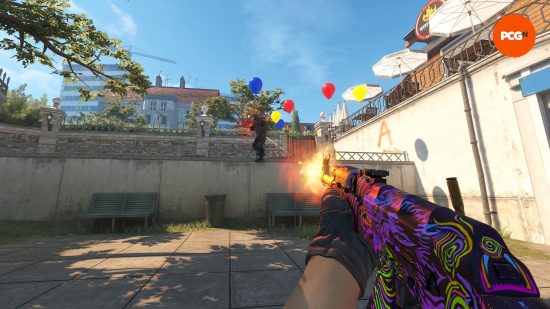
CS2 is undeniably in a barebones state. We’re still waiting for community server support and returning game modes – features that a lot of people have come to rely on over the years. Valve is going to add these missing components to the game at some point, but it’s obvious that the focus is to perfect the base gameplay first before adding any additional components. Right now, CS2 feels like you’ve come home after many years away, only to find that half of your possessions are missing. Sure, you’re glad to be back, but you still want to know when your things are going to be returned.
There’s something special about CS2 that, despite all of its flaws, is still capable of producing unrivaled gaming experiences. Whether it’s defying all odds to win a difficult round, or staging a comeback when it looks like all hope is lost, it’s moments like these that place CS2 into a league of its own. Valve has improved the Counter-Strike formula with the release of CS2, and it’s clear that things are only going to get better from here. That said, there’s a lot Valve needs to do to put the game on par with CSGO and ultimately in the shape it deserves to be in, and there’s no telling how long that will take.
[ad_1]

